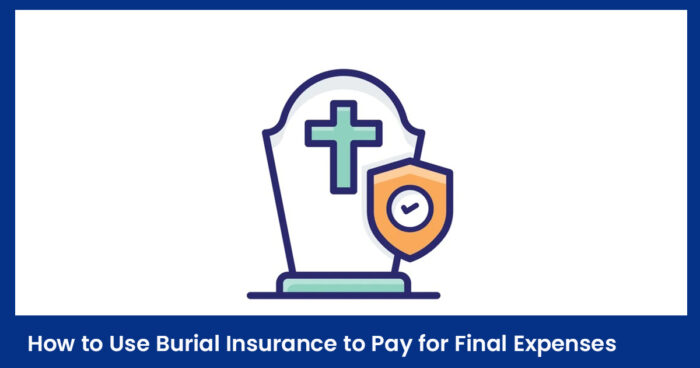How to Use Burial Insurance to Pay for Final Expenses – It’s not something we like to think about, but funerals can put a financial strain on families. If you are in your 50s, 60s, 70s, or 80s and do not have life insurance, a burial policy can help cover those costs. A recent report showed that paying for final expenses is the most common reason Americans choose to buy life insurance.

Burial insurance is a small life insurance policy designed to cover funeral and burial costs, along with other end-of-life expenses such as medical bills. These policies usually start at $1,000 and can go up to $25,000, though some companies may offer as much as $50,000. When you pass away, your beneficiaries can use the money however they choose.
Also called final expense insurance, burial policies are typically available to people aged 50 and older. In most cases, you will not need to take a medical exam to qualify for coverage.
Types of Burial Insurance
How to Use Burial Insurance to Pay for Final Expenses – Burial insurance is not a formal type of policy. It is a marketing term used to describe small whole life insurance policies, usually targeted at older individuals.
There are two main types of policies available: simplified issue and guaranteed issue.
- Simplified issue policies do not require a medical exam, but you will need to answer some health questions. If you use a wheelchair, live in a nursing facility, or have certain medical conditions such as cancer, heart disease, or diabetes, you may not qualify. However, many seniors in relatively good health are approved.
- Guaranteed issue policies are available without a medical exam or health questions. Since the insurer accepts more risk, this type of policy generally has higher premiums.
While term life insurance can also be used for final expenses, it may not be the best fit. It only lasts for the term selected, like 10 or 20 years, and you may outlive it. Term policies are better suited for specific financial goals such as mortgage protection or providing for children until adulthood.
Pros and Cons of Burial Insurance
Burial insurance can provide peace of mind and reduce the financial burden on your loved ones. It is especially useful for those with health conditions who may not qualify for other policies.
On the downside, these policies can be costly. Many come with a two-year waiting period. If the policyholder passes away from natural causes within that period, the insurer may only return the premiums paid or offer a reduced payout.
To avoid this, take time to review policy terms. Some reputable insurers offer options with no waiting period, which means coverage begins as soon as the policy is active.
How Much Does Burial Insurance Cost?
Burial insurance is usually more expensive because it is offered to older individuals and often does not require a medical exam. Without health details, insurers charge more to offset their risk. Costs increase with age, so it is wise to buy coverage sooner rather than later.
How much burial insurance do you need?
When deciding how much burial insurance to get, consider the specific expenses you want the policy to cover. The median cost of a funeral with viewing and burial is around $8,300, based on 2023 data from the National Funeral Directors Association. If you choose cremation, the median cost is about $6,280. These prices can vary depending on your location.
Ideally, your burial insurance should cover all the expenses you have in mind. Whether you prefer a simple service or something more elaborate with flowers, limousines and catering, your policy should relieve your family of the financial burden.
Burial insurance vs. funeral insurance
Although they may sound alike, burial insurance and funeral insurance are not the same. Burial insurance pays your chosen beneficiary, while funeral insurance usually pays the funeral home directly.
Burial insurance is similar to a basic whole life policy. When your beneficiary receives the death benefit, they can use it however they choose. While you can express your preferences, the policy does not place any limits on how the money is spent. This option is helpful if you want your loved ones to have more flexibility with the funds.
Funeral insurance, also called pre-need life insurance, is tied to a specific funeral plan. You typically work with a funeral home, make all the arrangements in advance and buy the policy through the funeral director.
In some cases, the funeral home may guarantee current prices, ensuring the insurance payout will cover the full cost even years later. With pre-need policies, the payout usually goes straight to the funeral home. This type of insurance is useful if you want to make detailed plans and reduce the pressure on your family. If that sounds right for you, reach out to your preferred funeral home to ask about pre-need options.



